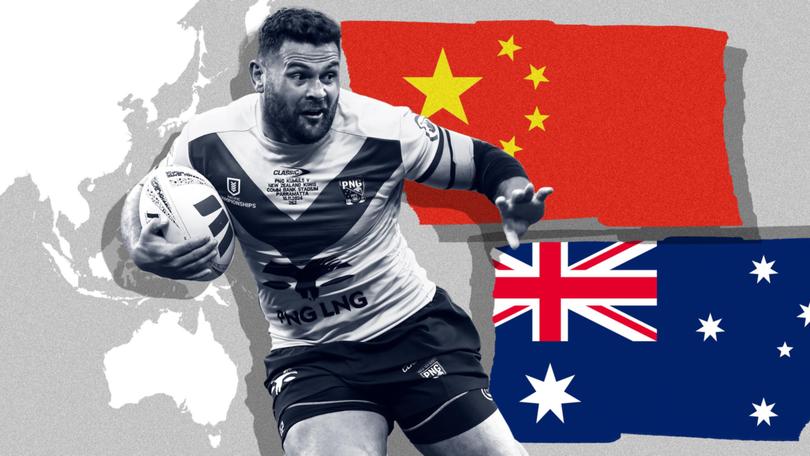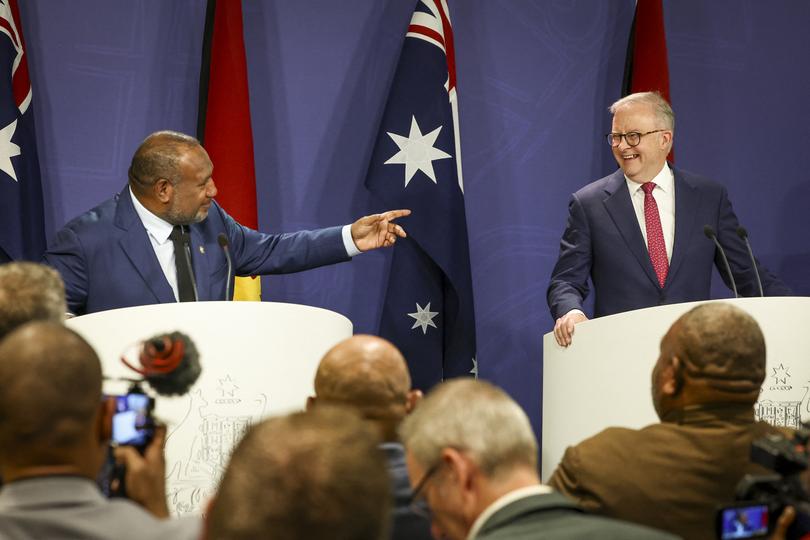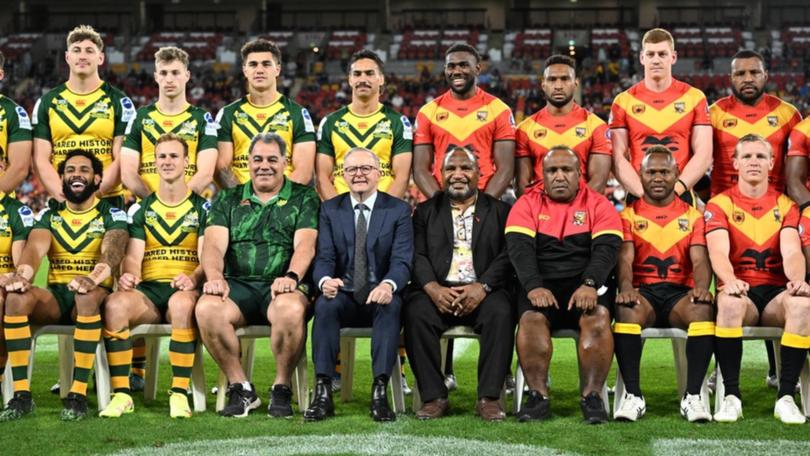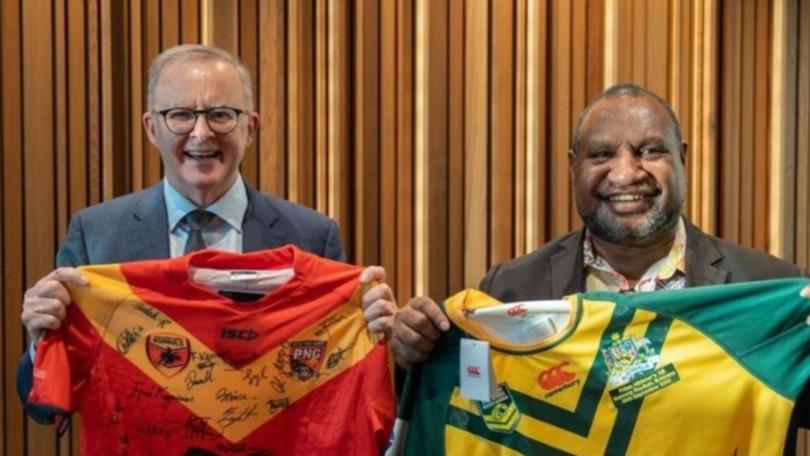Australia’s NRL deal with PNG a win for sport and for national security, tackling China’s Pacific ambitions
There’s few similarities between the rough and ready game of rugby league and chess. But Australia has used the football code to play a soft power gambit in its geopolitical chess game with China.

There’s few similarities between the rugby league field and the chessboard. But in its geopolitical chess game with China, Australia has used the football code to play a soft power gambit.
By signing a $600 million Rugby League deal with Papua New Guinea on Thursday, the Albanese Government has effectively locked out any attempt by Beijing to establish a national security foothold in Port Moresby for the next decade.
The hefty pay-out over 10 years will ensure the PNG team’s entry to the National Rugby League as the 18th team in 2028, but the agreement between two sports-loving nations also comes with a political price tag.
Sign up to The Nightly's newsletters.
Get the first look at the digital newspaper, curated daily stories and breaking headlines delivered to your inbox.
By continuing you agree to our Terms and Privacy Policy.An escape clause guaranteeing no breach of “strategic trust” will allow Australia to immediately terminate its financial support if PNG strikes a security or policing pact with China or any rival nation.
Ever since Canberra and Washington were blindsided by a sudden and secretive security deal between the Solomon Islands and China in Australia’s backyard in 2022, the Five Eyes allies have stepped up their tactics in the competition for strategic influence.
Beijing’s surprise move shortly after Honiara switched diplomatic allegiance from Taiwan to China triggered alarm that it could pave the way for Chinese troops and naval warships being posted less than 2,000 km from the Australian coastline.
China’s attempts to establish its presence in security and policing cooperation across the Pacific have also raised concerns.
Western allies have since intensified their efforts to rekindle ties and security cooperation with somewhat neglected Pacific Island capitals to thwart China’s expanding footprint across the geostrategic region, pre-emptively trying to block the possibility of future Chinese military basing.
Thursday’s announcement is the second attempt at sidelining China in under a week and the latest move in a multifaceted strategy to establish Australia as the main security partner for Pacific Island nations.
On Monday, Australia signed a landmark new pact with tiny Nauru that would prevent visits by Chinese warships and give Canberra a veto over the country’s future security, banking and telecommunications relationships in exchange for $140 million over the next five years in economic security support.
Earlier this year, Canberra struck a similar climate migration and security agreement with Tuvalu, committing $110 million on the understanding that Australia would have to “mutually agree” to any security arrangements that Tuvalu wants to strike with other countries.
Introducing the PNG Rugby deal on Thursday, Prime Minister Anthony Albanese called it a “game-changer for Australia’s relationship with PNG and a unifying force.”
“Australia’s relationship with the Pacific is profoundly important and our sporting ties are unique,” he added.
But an unpublished second agreement commits PNG to keeping Australia as its primary policing and security partner and not breaking “strategic trust,” even though PNG Foreign Minister Justin Tkachenko has already ruled out entering a security agreement with China.
The full parameters of this arrangement have not been made public.

Thursday’s announcement coincided with the entry into force of a separate Australia-PNG security agreement that commits both nations to maintain and strengthen co-operation in defence, policing, national security, climate change and disaster relief.
Mr Albanese defended the secretive nature of the Rugby League escape clause during a press conference alongside PNG Prime Minister James Marape.
“It’s certainly not a secret that our relationship is so strong, that we work together and part of that working together is because of our common values,” he said.
Mr Marape said the bilateral security agreement that came into effect on Thursday was signed before the NRL commitment and signalled his country’s interest “to have synergy with compatible police and compatible military” to tackle security challenges in both nations and the broader region.
“It is strategic for us, we made this deliberate choice to have Australia as a security partner of choice in the first instance,” he said, stressing that it did not preclude relations with other countries and that China would remain a strong trading partner.
“Is Australia pushing this on us? Far from it,” he said.
“It’s in our interest to have a secure PNG, a secure border, a secure relationship - (the) NRL team is a benefactor of those security arrangements.”
In Canberra, the deal has won guarded bipartisan support.
Shadow Minister for Foreign Affairs, Simon Birmingham, said the Coalition had “long held the view that sport can be a powerful tool for fostering deeper connections between nations,” but called for a detailed breakdown on how the funds would be allocated.
Oliver Nobetau, a Pacific Fellow at the Lowy Institute, said while middle and major powers had struggled in recent years to get a “ticket of exclusivity from PNG for security partnerships,” the newly announced arrangement “may be a step in that direction.”
It would help to repair strained ties between Canberra and Port Moresby and was part of a “broader mission to strengthen this bilateral relationship,” he said.
Australia had a comparative advantage over China in sports diplomacy, Mr Nobetau added. “It’s playing to their strength to achieve a common purpose there.”

Henry Campbell, strategic engagement and program manager of national security programs at the Australia Strategic Policy Institute (ASPI), said that Beijing still had a few cards of its own to play
“It isn’t purely a security deal and China might try to find new ways around it that we haven’t thought of. China could look for new ways to have influence – given their clear interests in the Pacific,” he told the Nightly.
Mr Campbell argued that while China cannot directly replicate this type of sports diplomacy, it capital, industry and regional banking presence offer it ways to influence or interfere.
“Things like BRI (Belt and Road Initiative) and infrastructure deals will be able to continue. But this should limit their ability to sign a security agreement,” he said.
But while Canberra may be opening itself to accusations of chequebook diplomacy, Thursday’s NRL deal also heralds hopes of inspiring a unifying force in an, at times, restive Pacific nation, and a win for sports fans in both countries.
Mr Albanese said the NRL team would have major implications for Papua New Guineans, where the sport was a religion.
A Papua New Guinea NRL team is a game-changer for Australia’s relationship with PNG and a unifying force – no two countries have a greater passion for rugby league, he said.
“Partnering on rugby league is a genuine and powerful way of building lasting ties between our peoples, and ensuring long-term development, social and economic outcomes for PNG and the Pacific.”
ARL Chair Peter Vlandy’s was not worried the federal government would cut and run if the security element of the deal was not adhered to by PNG.
“We are very confident with the agreement and confident it will go its 10 years,” he said.
“Like any other agreement, there are rights to certain parties.
“I have no concern whatsoever. One of the clauses in the contract is that I need to keep it confidential so I better honour that so I don’t breach it on the first day.”
V’landys also insisted the move would have an impact for the NRL across the entire Pacific.
“This new club will solidify rugby league’s role as the unifying language of our region,” V’landys said.
“The new PNG team provides the NRL with a new 10 million-plus audience, many who will go from being casual fans into engaged fans.”

Despite the widespread lawlessness in the country, a government source said they were confident the PNG government could ensure the security of Australian players who opt to join the new venture. The players will earn tax-free income in bid to entice them north.
Mr Marape went further saying he would bet his “life” NRL players would be safe in the capital, Port Moresby. The government plans to build the team a compound within the city.
“Firstly, security is all part of the mix. This is not an event conversation for PNG and Port Moresby. It’s a lifestyle transformation. It’s a total lifestyle transformation for us,” he said.
“We saw what APEC did for Port Moresby in 2018. APEC, hosting APEC changed Port Moresby for the better. But for this NRL to be hosted out of Port Moresby, the team to be based out of Port Moresby, it gives me the enough reason now to make sure Port Moresby is safer, Port Moresby is cleaner, Port Moresby is better to host continuous international games post 2028.”
“So, come 2028 I can give you, I bet my life on this, I want to bet my life on this, it is in my own national interest to make your PNG safer.
“And we want to make it safe for our players. We want to recruit the best players available.
He said the PNG team would be striving for early success and was not just there to “make up the numbers” but wanted to win a title.
“This one team will be for one people, one country, one nation, a national unifier,” he said.
“An NRL team for PNG is more than just sports – it is a national unification strategy. With our diverse cultures and people, rugby league can bring us together as one nation. At the same time, it strengthens the shared history and people-to-people links between PNG and Australia.”
The NRL is also a big winner out of the deal, with it getting a $60m licence fee, while $290m will go to the franchise itself, and $250m will go towards growing the game in PNG and fostering Pacific competitions.
